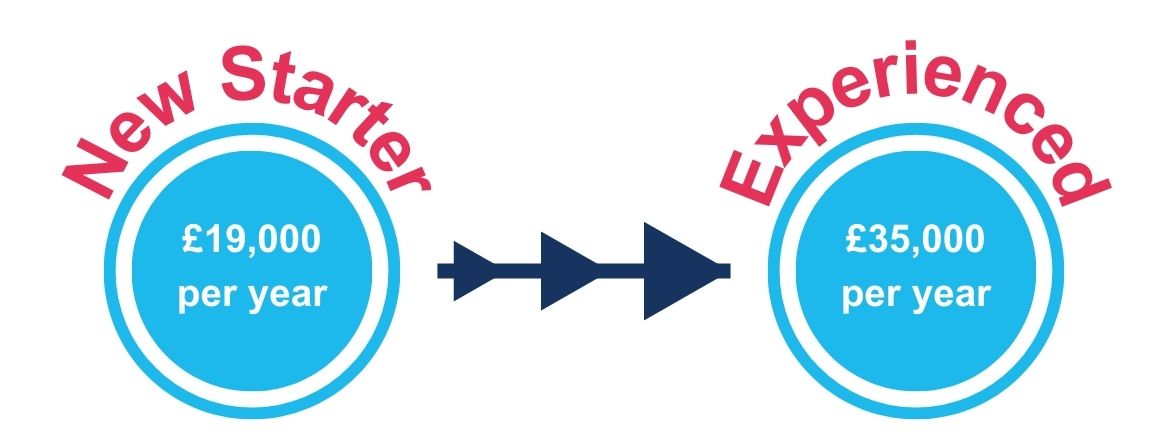In this apprenticeship you will be working with children, young people and families, including carers in a residential setting, to achieve positive and sustainable change in their lives. You will demonstrate a passion to care for and about children, young people and families. You will be skilled in recognising and assessing the complex needs that children, young people and families often present. You will agree with the child, young person or family any specific interventions or referrals.
Your approach will be one of respectful curiosity that challenges and supports children, young people and families to achieve their potential and stay safe. You will work alongside other professionals and organisations to share the responsibility for improving outcomes. Each piece of work with a child or family will be different and you will exercise judgement on a range of evidence-based approaches to inform your practice. You will regularly evaluate the effectiveness of your methods and actions. Regular supervision with an experienced practitioner will encourage reflection on your practice. At the end of the apprenticeship the high quality of your practice will be making a real difference to those that you work with.
OPTION 1: Practitioner in children's residential care You could be working in a number of settings e.g. a children’s home, a residential special school or a secure children’s home. The children might be living on their own or in a larger group. You will take the lead in developing and delivering the child's placement plan and will work with the child to support their health, education, social and day to day needs, playing a significant role in helping them to thrive and fulfil their potential .
OPTION 2: Children, young people and families practitioner within the community You will understand the importance of and be skilled in, early intervention and safeguarding work. You will manage risk across the spectrum needs for children, young people and families'. You may work in settings as diverse as family homes, youth centres, early years, youth justice, children's centres, educational settings and the community. You will play a significant role in working across agencies to improve outcomes. You may work with particular age groups, across the full age range or specifically with families. By supporting the confidence and skills of children, young people and families you will help them to overcome barriers and maximise their independence.
Course requirements
- Apprentices without Level 2 English and maths will need to achieve this level prior to taking their end point assessment.
- A British Sign Language (BSL) qualification is an alternative to the English qualification for those whose primary language is BSL
The values and behaviours expected of a Children, Young People and Family Worker:
Care: Respecting and valuing individuals to keep them safe, being affirming and working with them to help them make a positive difference to their lives
Compassion: Consideration and concern for children, young people and their families, combined with an understanding of the perspective of those you work with
Courage: Honesty and a positive belief in helping children, young people and families. Being confident when faced with confrontation, holding a safe space to manage and contain really difficult behaviours and working with children, young people and families to challenge and enable them to fulfil their potential
Communication: Your work is based on building effective relationships, being perceptive and empathic and building good rapport Competence: The relationships you build to effect change for children, young people and families will be informed by social care ethics and values and will be developed through reflective practice
Commitment: Creating sustainable change in others by working alongside children, young people and families and being authentic, consistent, patient, persistent and resilient
- Communication that enables the voice of the child, young person or family members to be heard
- Multiple factors that contribute to uncertainty in the lives of children, young people and families
- Equality, rights, diversity and cultural differences, and the values of the organisation in which you are working
- The range of potential safeguarding risk factors (e.g. domestic violence, membership of gangs, missing children, online activity, radicalisation and Prevent agenda), the different forms of harm to children and vulnerable adults (e.g. neglect, child sexual exploitation, physical abuse, emotional abuse) and the local and national thresholds for safeguarding
- The safeguarding requirements contained within mandatory local safeguarding training or nationally accredited equivalent
- Child, adolescent and adult development
- The spectrum of needs and how they may be met
- The principles of effective assessment and the importance of analysis and professional judgement
- Models for monitoring changes in a child, young person or family member’s wellbeing
- A range of evidence based interventions and their strengths and weaknesses
- The duties, responsibilities, boundaries and ethical nature of the role
- Theories and guidelines underpinning sound practice
- Communicates in way that enables the voice of the child, young person or family members to be heard
- Encourages individuals to engage positively with their community and relevant agencies and actively participate in the way their care and support is delivered
- Actively promotes respect, equality, diversity and inclusion
- Works together with children, young people and families to keep them safe and manage risk and promoting the development of skills the family need to successfully manage risk themselves
- Works with and supports other professionals to respond to safeguarding concerns
- Identifies the influences on the individual and the family and supports them to make informed choices
- Leads on the development and recording of holistic plans, delivery of interventions and evaluates their effectiveness
- Identifies and addresses barriers to accessing resources
- Identifies and manages evidence-based approaches and evaluates their effectiveness
- Contributes to the development of a resilient, consistent and persistent approach to practice
- Models clarity of purpose, clear expectations and a professional approach to decision making
- Appropriately challenges and/or offers alternative perspectives with the children, young person or family
- Contributes to own professional development
Assessment Methods
This is a knowledge based course with practical aspects that will need to be demonstrated.
End-Point Assessment
- Knowledge test
- Professional discussion underpinned by a portfolio
Assessment Methods
Upon the successful completion of this apprenticeship, why not continue to study on one of these courses:




